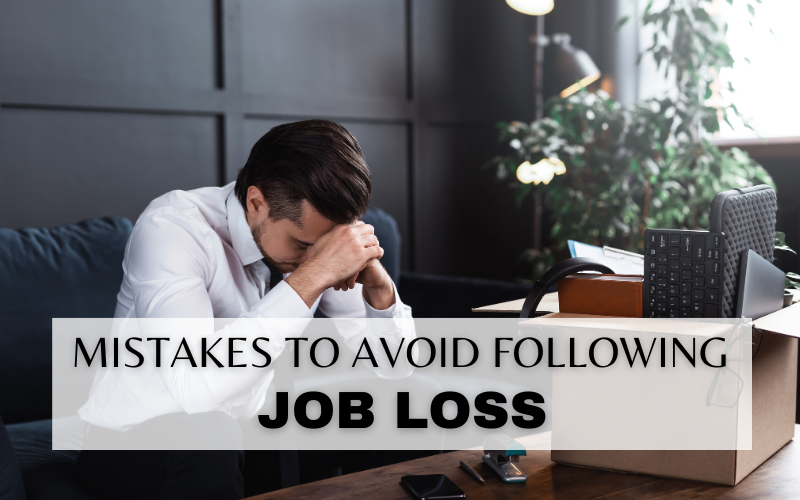I’m extremely privileged to have been able to help thousands of people to find and land their dream job since starting my coaching and leadership development business, What Next?, back in 2009.
A large part of what I do is providing outplacement and redeployment training to people who are either under threat of redundancy or who have lost their job for whatever reason.
I work with them either as delegates on my career management workshops, on a one to one basis or, since lockdown, through my webinars and online courses.
Talking to so many people in this situation has given me a unique insight into the thought processes of those going through such significant change.
Following conversations I’ve had with new clients recently, I thought it pertinent to share some of the common thought processes that people have when they find themselves in such a position.
I aim to help you avoid typical ‘knee jerk’ reactions, which can negatively impact on your future prospects and happiness.
1. Believing there are no good jobs out there
I understand why people might think this; after all, we are about to nose dive into a recession. However, they were saying this long before Covid19 struck.
Typically, we listen far too much to what we’re told in the news (and to what other people say) and subconsciously take on board what we repeatedly hear. The result; many people stay stuck in roles they hate (for fear of change) or end up in learnt helplessness, not knowing what to do to find the right next job for them. Some even take roles that they are not suited to just because ‘it’s a job’.
True, there is fierce competition out there, but I can say with confidence that everyone who wants a job ultimately finds one. It may mean being more creative and consistent in your job search; you have to spread your net wider, use your network to the full, register with multiple online job sites and recruitment consultancies and use LinkedIn to the max. Still, there are, undoubtedly great jobs out there. My clients are a testament to that.
You also need a great tailored CV (adjusting your CV to EVERY role you apply for) and excellent interview skills (you can prepare for up to 85% of any interview – preparation is everything). To say there are not great jobs or companies aren’t recruiting, simply is not true.
2. Believing you’re too old
That statement annoys me. If you have excellent skills and experience, it shouldn’t stop you from applying for roles that appeal to you. For one, it’s illegal to discriminate on the grounds of age, two, with age comes heaps of experience.
However, that said, one thing that does put companies off recruiting ‘older’ job seekers is their perceived inability to change/embrace new technology/ways of working. If you are a more mature candidate, thoroughly familiarise and update yourself on the latest technology/apps/programs; this is especially pertinent if you’ve worked in the same company for a long time, and may only know one way of doing things. Recruiters want to see that you’re flexible and willing to learn.
Seek training to fill any gaps, either formally (there are lots of great training providers out there), through YouTube (they have videos on just about everything) or ask family/friends to help you. Everybody, no matter what their age, can learn new things. I hate the term, ‘You can’t teach an old dog new tricks’; it’s nothing more than an excuse people use so that they don’t have to try. Every time we learn something new, we create new neural pathways in the brain; this works in the same way whether we’re 25 or 55.
When people say they ‘can’t’ learn, it’s down to their unwillingness (learnt helplessness) not their ability. EVERYONE can learn, and it’s up to you to demonstrate that you are up to date and willing to be flexible.
You will also need to be prepared to work flexibly, i.e. different hours/days, working from home, etc. For many businesses, gone are the 9-5, Monday to Friday ways of working.
3. Being prepared to drop your salary
Pretty much the first thing a job seeker will tell me is, ‘I’ve talked it through with my partner, and I can afford to drop my salary by X’. Oh my goodness – why would you want to do that?! They haven’t even started their job search, and yet they are already talking about taking a cut.
Dropping your salary should be a last resort; you should only consider it after you’ve tried everything else. I don’t doubt that you have worked incredibly hard to get where you are and to earn your current salary; therefore, you should avoid giving it up without something in return.
Of course, there are all sorts of reason why you may consider dropping your salary from the outset. For example, taking on lesser responsibility, a shorter commute, relocation, etc. but if none of those things applies to you, avoid decreasing your pay and benefits unless you have to; know your worth and stick to it.
4. Being prepared to take a step down
Considering ‘taking a step down’ is common, particularly with people who’ve had a stressful time at their last company. I often hear this with senior clients who’ve lost their job due to ‘underperformance’, issues with ‘fit’ or where there isn’t a role for them in a new structure.
They will commonly say, ‘I don’t want that stress again, so I’m considering applying for lesser roles’. Typically it’s because their confidence got eroded over the previous 6-12 months and, as a result, they begin to doubt their ability and willingness to do a more senior role in the future.
Usually, these clients have had an impeccable record up until this point; therefore, part of my role is to help them understand their thoughts and emotions and assist them in building back their confidence and self-esteem.
If you recognise yourself here, remember that everything that’s within you that got you to your current position is still there, and it won’t go away if you take more junior role.
If you take a step down, the likelihood is that you will end up working for someone less able, less qualified and with less experience than you. Moreover, likely, you won’t have the same authority and decision-making ability, and you’ll end up feeling extremely discouraged and even downright depressed!
Therefore, if you are considering taking a step down, make sure you’re doing it for the right reasons, not merely because of a lack of confidence/self-esteem due to recent experiences.
5. Using a ‘scatter-gun’ approach to applying for jobs
‘I’ve applied for 100 jobs and not got one interview’ when people tell me this; I’m not surprised that they haven’t got an interview. Typically, they’ve used what I call a scatter-gun approach, i.e. applying for lots of jobs (many of which won’t even be suitable) out of sheer panic. In this situation, they invariable won’t have tailored their CV and will have sent the same one, together with the same covering letter, in response to every advert.
A recruiter needs to be able to see immediately, ON THE FIRST PAGE, where your skills and experience match their role. If they have to sift through multiple pages of irrelevant information to find a link, I guarantee it will end up in the ‘no’ pile.
Get clear about what you want from your next role (I have a great FREE tool for that; click here to learn more). Target those roles that match your desired criteria and tailor your CV so that it contains lots of corresponding information, showing your ability, experience, achievements and qualifications that make you a good match for that role.
One final thing, in my considerable experience, I know for sure that:
THE ELATION OF FINDING A JOB AND BEING ABLE TO PAY YOUR BILLS, LASTS NO MORE THAN THREE MONTHS.
After that, the reality of doing that job every day, day in day out, for the foreseeable future, kicks in. So, it’s critical to find the right next job rather than just any job.
Of course, it’s easier to find a new role when you’re in one; however, it’s almost impossible to find the right one if your self-esteem and confidence is damaged even further because you made the wrong choice. Therefore, if you can afford to be selective and wait for the right job (I realise that isn’t always possible due to financial constraints), I recommend that you do so.
For more information on this and other related topics, my FREE online mini-course, Your Dream Job, containing many of my top tips for job seekers, is available. Click here for more information.



